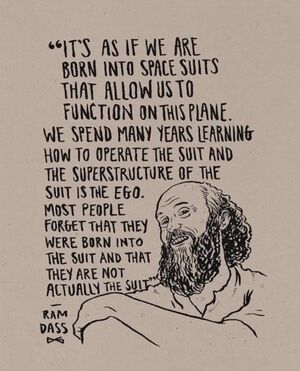The Objectivity Assumption: Difference between revisions
mNo edit summary |
mNo edit summary |
||
| (27 intermediate revisions by the same user not shown) | |||
| Line 1: | Line 1: | ||
[[File: | ''“The belief that one’s own view of reality is the only reality is the most dangerous of all delusions.”'' - Paul Watzlawick[[File:Ram Dass Objectivity.jpg|alt=Naive Realism|thumb|'''Figure 1'''. Our senses are an abstraction from the world.]] | ||
''' | '''We often assume that our perceptions are accurate and objective reflections of reality, but they are actually mental constructs shaped by our minds.''' Human perception has always been an abstraction rather than a direct replication of the world around us. | ||
This abstraction arises from the fact that we perceive the world through a unique lens. Our brains create an internal representation of external events by analyzing various features. For example, our perception of color does not directly correspond to reality; rather, colors are synthesized by our brains to distinguish between different light wavelengths. | |||
This assumption of objectivity alongside declining [[neuroplasticity]] is an evolved trait that serves our survival by allowing us to navigate our environment without constant questioning. However, in today’s information age—our modern savanna—recognizing our inherent perceptual [[Cognitive Biases|biases]] is essential for navigating this new world. While our perceptions are subjective, this does not mean that all perceptions are equally valid or that objective truth is absent. Rather, it highlights the importance of confronting our [[cognitive dissonance]] and actively challenging our [[cognitive biases]] to achieve a more accurate understanding of the world. | |||
Latest revision as of 10:16, 4 March 2025
“The belief that one’s own view of reality is the only reality is the most dangerous of all delusions.” - Paul Watzlawick
We often assume that our perceptions are accurate and objective reflections of reality, but they are actually mental constructs shaped by our minds. Human perception has always been an abstraction rather than a direct replication of the world around us.
This abstraction arises from the fact that we perceive the world through a unique lens. Our brains create an internal representation of external events by analyzing various features. For example, our perception of color does not directly correspond to reality; rather, colors are synthesized by our brains to distinguish between different light wavelengths.
This assumption of objectivity alongside declining neuroplasticity is an evolved trait that serves our survival by allowing us to navigate our environment without constant questioning. However, in today’s information age—our modern savanna—recognizing our inherent perceptual biases is essential for navigating this new world. While our perceptions are subjective, this does not mean that all perceptions are equally valid or that objective truth is absent. Rather, it highlights the importance of confronting our cognitive dissonance and actively challenging our cognitive biases to achieve a more accurate understanding of the world.
